Written for the 2019 catalogue of Il Cinema Ritrovato in Bologna. — J.R.
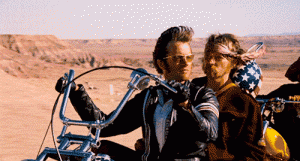
Along with the equally influential 2001: A Space Odyssey, Easy Rider (1969) was one of the key “trip” movies of the late 60s, making its music more expressive than its dialogue and defining a generational divide by cutting audiences into two. As critic J. Hoberman has noted, the film “was above all fashionable” when it first appeared “and hence it dated almost immediately”. Yet arguably it is this datedness (unlike that of 2001) that defines much of its value today, as a time capsule offering certain parallels of hippies versus rednecks with current struggles between progressives and minorities versus reactionary Trump supporters.
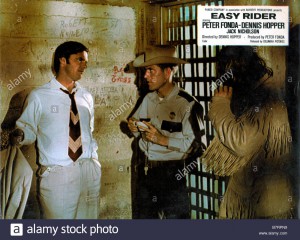
Even though Easy Rider, according to auteurist protocols, is mainly associated with its director, costar, and cowriter, Dennis Hopper, it seems appropriate that it’s being shown in Bologna as part of a tribute to Peter Fonda, its producer, costar, and cowriter. Fonda actually originated the project by pitching its basic premise — a contemporary Western with motorcycles replacing horses as its two heroes, named Wyatt (Fonda) and Billy (Hopper) to suggest Wyatt Earp and Billy the Kid, emerge from a drug score to drive east across the country to attend the New Orleans Mardi Gras. Read more
From Monthly Film Bulletin, January 1975 (Vol. 42, No. 492). -– J.R.
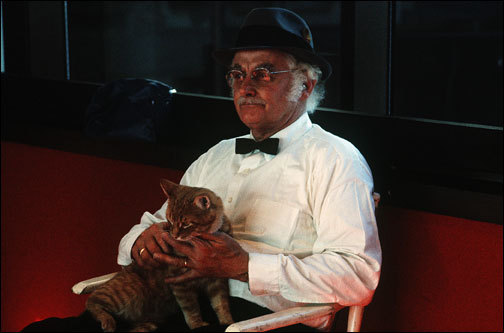
Harry and Tonto
U.S.A., 1974
Director: Paul Mazursky
Harry Coombs, an elderly widower who lives with his cat Tonto, is evicted from his West Side Manhattan apartment when the building is slated for demolition. After spending some time in the suburban home of his son Burt, where he tends To sympathize with the vow of silence taken by his grandson Norman over the objections of the latter’s parents and more conventional brother, he decides to visit his daughter Shirley in Chicago. Quarrelling with security officials at the airport about his carrying case for Tonto, he decides to go to Chicago by bus, but leaves the vehicle en route when Tonto refuses to relieve himself in the bus toilet. He buys a used car and picks up Ginger, a runaway- teenager, who decides to accompany him and persuades him to look up an old flame, Jessie, in Fort Wayne, Indiana, where she is residing in an old folks, home. In Chicago he re-encounters Norman, dispatched by Burt to bring him back to New York; but after a short stay with Shirley, he decides to drive West with Norman and Ginger. He leaves the car with the youngsters in Arizona so that he can drive to a commune, and hitch-hikes from there to California — encountering on the way a health food salesman named Wade, a prostitute offering free fornication, and an Indian named Sam Two Feathers with whom he shares a jail cell after urinating on a sidewalk plant in Las Vegas. In Read more
From the Chicago Reader (October 31, 1997). — J.R.
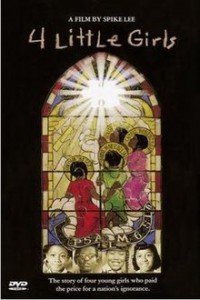
This surprisingly humble documentary by Spike Lee may be his best film to date apart from Do the Right Thing. It’s not weighed down by an ounce of flab or hype, and the story it tells is profoundly affecting. On September 15, 1963, four little black girls attending Sunday school at Birmingham’s 16th Street Baptist Church, a central meeting place in the civil rights movement, were killed in a racist bombing. This is a detailed exploration of what that event meant 34 years ago — to family, friends, and the movement — as well as what it means today. In the only picture Charlie Parker ever painted — a beautiful portrait of a daughter who died in infancy — he imagined what she might have looked like in her 30s, and in 4 Little Girls Lee gets us to imagine something comparable. He uses John Coltrane’s “Alabama” with tact and sensitivity, making up for his crude use of the piece in Malcolm X, and he seems to have learned a fair amount about my home state. Perhaps for the first time, Lee actually finds something to say about history — my only quibble is that he doesn’t tell us more about the belated sentencing of the bomber. Read more
Written for Il Cinema Ritrovato’s 2019 catalogue. — J.R.
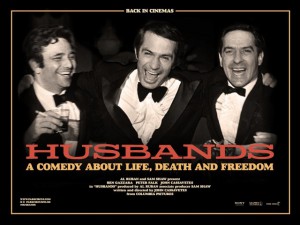
HUSBANDS
Subtitled “A Comedy about Life, Death and Freedom,” John Cassavetes’ most politically incorrect and machocentric movie (1970), made after the huge commercial success of his 1968 Faces and exercising both the creative control and the studio support it suddenly made possible, is arguably the most improvised and workshopped of his features. Inspired in part by the death of Cassavetes’ older brother Nick in 1957 at the age of 30, the film recounts what happens to a trio of 40ish east coast suburbanites (Cassavetes, Peter Falk, and Ben Gazzara) when their best friend dies and they decide to play hooky from their lives and families to recover their camaraderie and identities. But even though their collective flight seemingly has something to do with life, death, and freedom, there isn’t a Huck Finn in the bunch; they’re all Tom Sawyers, too desperate in their frantic fun and games to be as comic as they want to see themselves. Their fear of female assertiveness and their periodic brutality, as well as Cassavetes’ determination to follow the actors’ instincts and movements wherever they go without chalk marks are likely what inspired Elaine May to co-opt Cassavetes, Falk, and Husband’s cinematographer Victor J. Read more





